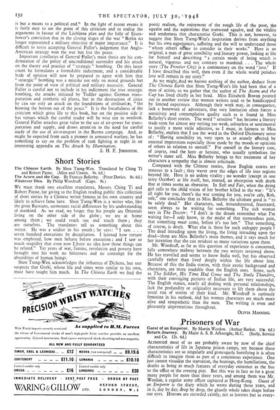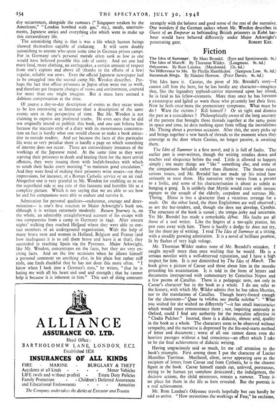Prisoners of War
ALTHOUGH most of us are probably aware by now of the chief characteristics of life in Japanese prison camps, yet because these characteristics are so singularly and grotesquely horrifying it is often difficult to imagine them as part of a continuous experience. One just cannot visualise the starvation, the beatings, the humiliations, the deaths as being as much features of everyday existence as the bus to the office or the evening pint. But this was in fact so for a great many people for more than three years, and among them was Mr. Weedon, a regular army officer captured at Hong-Kong. Guest of an Emperor is the diary which he wrote during those years, and in it, day by day,-arop by drop, the ghastly whole takes shape before our eyes. Horrors are recorded calmly, not as horrors but as every-
day occurrences, alongside the rumours (" Singapore retaken by the Americans," " London bombed with gas," etc.), meals, entertain- ments, Japanese antics and everything else which went to make up this extraordinary life.
The astonishing thing is that it was a life which human beings showed themselves capable of enduring. It will seem doubly astonishing to anyone who spent some time in German prison camps. For in Germany one's personal morale often sank as low as one would have believed possible this side of sanity. And yet one had more food, more clothing, no earthquakes, a certain amount of respect from one's captors and above all (thanks to the efforts of a few) regular, reliable war news. Even the official Japanese newspaper had to be smuggled into the second camp Mr. Weedon describes. Per- haps the fact that officer prisoners in Japan often went out to work, and therefore got frequent changes of views and environment, counted for more than one might imagine. But it must have seemed a dubious compensation at the time.
Of course a day-to-day description of events as they occur tends to be less interesting as literature than a description of the same events seen in the perspective of time. But Mr. Weedon is not claiming to express any profound truths. He even says that he did not originally intend to publish this book, and one can believe him because the staccato style of a diary with its monotonous concentra- tion on fact is hardly what one would choose to make a book attrac- tive to outside readers. And yet because the facts of this particular life were so very peculiar there is hardly a page on which something of interest does not occur. There are extraordinary instances of the workings of the Japanese mind. At the same time as they were starving their prisoners to death and beating them for the most trivial offences, they were issuing them with loofah-brushes with which to scrub their backs every morning " to maintain good circulation." And they were fond of making their prisoners write essays—on their impressions, for instance, of a Roman Catholic service or an air raid. Altogether one is very grateful to Mr. Weedon for enabling us to see the superficial side at any rate of this fantastic and horrible life as a complete picture. Which is not saying that we are able to see how he and his companions were able to endure and survive it.
Admiration for personal qualities—endurance, courage and deter- mination— is one's first reaction to Major Arkwright's book too, although it is written extremely modestly. Return Tourney is, on the whole, an admirably straightforward account of his escape with two companions from a camp in Germany in 1942. After sixteen nights' walking they reached Hoiand where they were able to con- tact members of an undergrotind organisation. With the help of many brave men and women in Holland, Belgium and France (and how inadequate it is to call them brave and leave it at that), they succeeded in reaching Spain via the Pyrenees. Major Arkwright, like Mr. Weedon, concentrates on the facts, but they are very ex- citing facts. And on the few occasions when he allows himself a personal comment on anything else, in his plain but rather stiff style, one feeds thankful that he has not done this more often. " I know when I look into a German's eyes," he writes, " that he is hating me with all his heart and soul and strength ; that he cannot help it because it is inherent in him." This sort of thing contrasts strangely with the balance and good sense of the rest of the narrative. One wonders if the German sailors whom Mr. Weedon describes in Guest of an Emperor as befriending British prisoners in Kobe har- bour would have behaved differently under Major Arkwright's



































 Previous page
Previous page